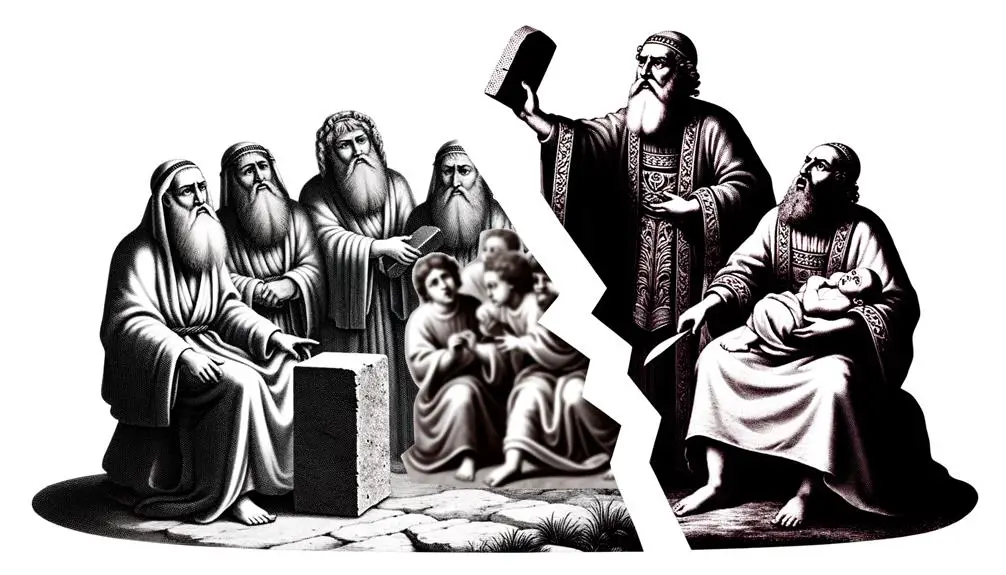Learn about the biblical definition of contention and how it reveals lessons on conflict resolution, leaving you eager to explore deeper.

Definition of Contention in the Bible
In the Bible, contention divides as it disrupts, it challenges as it changes. You'll find that the scriptures don't shy away from the concept of contention, offering insight into its nature, its consequences, and its resolution.
From the familial discord between Jacob and Esau to the ideological clashes among the early Christians, the Bible serves as both a mirror and a map for navigating conflict. As you explore further, you'll discover not just the types of contention that permeated biblical times but also the timeless lessons on fostering peace and understanding in the midst of disagreement.
What awaits is a journey into understanding how these ancient texts can inform modern methods of resolving conflict.
Key Takeaways
- Contention in the Bible often arises from human failings like envy and pride.
- Scripture portrays contention as a deep-seated issue that requires divine guidance to overcome.
- The Bible views contention as an opportunity for growth through forgiveness and learning.
- Biblical teachings on resolving contention emphasize communication, patience, empathy, and proactive reconciliation.
Biblical References to Contention

In exploring the concept of contention within the biblical context, one finds numerous passages that illustrate how contention manifests among individuals and communities, reflecting broader moral and spiritual lessons. The origins of contention, as depicted in the Bible, often stem from a variety of human failings, including envy, pride, greed, and a lack of faith. These sources highlight the complexity of human nature and the challenges inherent in maintaining harmony and understanding.
The Scriptures frequently address contention, not merely as a historical or anecdotal matter but as a deep-seated issue that requires divine intervention for resolution. Instances of divine interventions in cases of contention serve as pivotal moments that underscore the necessity of seeking guidance and wisdom beyond human capabilities. Such interventions often aim to restore peace, teach humility, and promote a sense of communal responsibility and love.
Analyzing these biblical narratives reveals a pattern where contention isn't only a consequence of sin but also an opportunity for growth and learning. The divine responses to such conflicts emphasize the possibility of overcoming contention through faith, repentance, and a sincere effort to align one's actions with divine principles. This approach suggests that while contention is an inevitable part of the human experience, its resolution lies within the capacity for spiritual growth and understanding.
Therefore, the biblical references to contention, coupled with the examples of divine interventions, provide a rich framework for understanding how such conflicts arise and how they can be effectively addressed. They offer insights into the nature of human relationships and the potential for transformation even in the face of deep-seated disagreements.
Types of Contention Illustrated

The Bible showcases various types of contention, ranging from interpersonal disputes to larger communal conflicts, each reflecting underlying moral and spiritual dilemmas. This diversity in conflict underscores the multifaceted nature of human interaction and the complexity of aligning it with divine principles.
- Interpersonal Disputes: These are often the most relatable forms of contention, involving disagreements between individuals. They can stem from jealousy, misunderstanding, or differing values. The emotional weight of these disputes is significant because they disrupt the harmony and unity that are highly valued in biblical teachings. Such conflicts serve as a mirror, reflecting the personal struggles we all face in managing relationships and adhering to a moral compass amidst life's challenges.
- Contentious Debates: These involve deeper, often public, disagreements that can arise within communities of faith. Contentious debates aren't merely about differing opinions but delve into interpretations of doctrine and practice. They highlight the struggle to balance tradition with evolving understanding, showcasing the tension between human reasoning and divine revelation. The emotional impact here stems from the potential for division within a community that ideally seeks to embody unity and love.
- Spiritual Discord: This type of contention transcends the physical realm, representing a conflict between spiritual values and worldly temptations. Such discord can lead to a crisis of faith, challenging individuals to remain steadfast in their beliefs despite external pressures. The emotional depth of spiritual discord lies in its existential nature, questioning the very foundation of one's identity and purpose in the world.
Each type of contention illustrated in the Bible serves as a lesson in navigating the complexities of life while striving to maintain integrity and faith.
Contention Among Biblical Figures

Biblical narratives frequently showcase contention among key figures, highlighting the multifaceted challenges of adhering to faith amidst personal and communal conflicts. You'll find that the Bible does not shy away from depicting the raw and often uncomfortable realities of human emotions and disputes, offering a candid view of the struggles faced by its characters.
One of the earliest instances of contention is driven by Cain's jealousy towards his brother Abel, which tragically culminates in the first recorded act of murder. This pivotal story lays the groundwork for understanding the destructive potential of envy and rivalry.
Moreover, the New Testament offers insight into the Apostles' debates, illustrating the complexities of leadership and the challenges of spreading a new faith. These disputes, while sometimes theological, often revolved around more practical concerns of community management and the inclusion of Gentiles into what was initially a Jewish sect.
Here's a brief overview of notable contentions within the Bible:
Biblical Figure(s) |
Nature of Contention |
Outcome |
|---|---|---|
Cain and Abel |
Cain's jealousy leading to murder |
Cain's exile |
Jacob and Esau |
Birthright and blessing rivalry |
Reconciliation |
Joseph and His Brothers |
Jealousy over favoritism |
Joseph's rise in Egypt, reunion |
Moses and Pharaoh |
Liberation of the Israelites |
Exodus of the Israelites |
Paul and Peter |
Gentile inclusion in the Christian faith |
Establishment of church doctrine |
This table encapsulates the diversity of conflicts, from familial jealousies to foundational theological debates, each contributing to the rich tapestry of biblical teachings on human nature and divine guidance.
Lessons on Resolving Conflict

Numerous instances of contention within the Bible offer invaluable lessons on the importance and methods of conflict resolution. These narratives not only highlight the detrimental effects of unresolved disputes but also provide a blueprint for mending relationships through forgiveness and enhanced communication. By analyzing these biblical accounts, you can glean profound insights into resolving conflicts in your own life.
The key to overcoming contention, as demonstrated in the Bible, lies in adopting a proactive approach to reconciliation. This involves:
- Forgiveness Strategies: You're encouraged to let go of grudges and seek forgiveness, a principle deeply rooted in Christian doctrine. This act isn't just about absolving others; it's a pathway to personal peace and spiritual growth. The act of forgiving, as shown through biblical teachings, can dramatically transform strained relationships into harmonious ones.
- Communication Improvement: Effective communication is fundamental in resolving disagreements. The Bible emphasizes the need for clear, honest, and compassionate dialogue. By listening attentively and expressing your thoughts respectfully, you pave the way for mutual understanding and resolution.
- Patience and Empathy: Demonstrating patience and empathy towards those you're in conflict with can greatly facilitate the resolution process. Understanding their perspective and showing compassion can bridge gaps that seemed insurmountable.
Promoting Peace and Understanding

How can individuals foster an environment of peace and understanding, drawing from biblical teachings that prioritize these virtues? The Bible, a cornerstone of wisdom for many, offers profound insights into promoting harmony. It underscores the importance of forgiving attitudes and compassionate dialogues as pivotal elements in this quest.
Forgiving attitudes aren't merely suggested but are central to biblical teachings. In Matthew 18:22, Jesus advises to forgive not just seven times, but seventy times seven, illustrating the boundless nature of forgiveness. This directive encourages individuals to release grudges and bitterness, which often serve as barriers to peace. By embracing forgiveness, you're not only liberating yourself from the chains of resentment but also paving the way for genuine reconciliation.
Compassionate dialogues, on the other hand, emphasize the value of empathy and understanding in communication. James 1:19 teaches to be quick to listen, slow to speak, and slow to become angry. This guidance fosters an environment where individuals feel heard and valued, significantly reducing the likelihood of misunderstandings and conflicts. Through compassionate dialogues, you're equipped to bridge divides, acknowledge differing perspectives, and cultivate a mutual respect that underpins a peaceful community.
Frequently Asked Questions
How Has the Interpretation of Contention in the Bible Evolved Over Time Within Different Christian Denominations?
You've noticed that interpretations of biblical contention have evolved significantly across Christian denominations. This shift is largely due to theological debates and denominational differences that shape how scriptures are understood.
As scholars and believers delve into the texts, they bring diverse perspectives that highlight or downplay various aspects of contention. This analytical approach has led to a rich tapestry of understandings, reflecting the dynamic nature of Christian theology and its communities.
Are There Any Cultural or Historical Contexts in Which the Biblical References to Contention Were Particularly Influential or Controversial?
Absolutely, cultural adaptation and historical impact have played pivotal roles in how biblical references to contention have resonated or sparked debate.
You'll find that during moments of social upheaval or reform, these references were particularly influential, serving either as a catalyst for change or as a point of resistance.
Scholars analyze these instances, noting the dynamic interplay between scripture interpretation and the prevailing cultural or historical currents, showcasing a rich tapestry of evolving religious thought.
How Do Non-Christian Religions or Belief Systems View the Concept of Contention as Presented in the Bible?
When exploring how non-Christian religions view biblical contention, it's crucial to consider out Islamic perspectives and Buddhist teachings.
In Islam, while there's respect for the Bible's moral teachings, contention is often interpreted through the Quran's lens, emphasizing unity and community harmony.
Buddhism, focusing on inner peace and enlightenment, regards contention skeptically, advocating for resolution and understanding rather than conflict.
Both perspectives offer nuanced views that contrast with and complement biblical interpretations.
What Role Does Modern Psychology Say About the Nature of Contention and Conflict Resolution Strategies Compared to Biblical Teachings?
Modern psychology highlights conflict theory and psychological resilience as keys to understanding contention.
You'll find that psychologists emphasize the importance of resilience in navigating conflicts, contrasting with biblical teachings that often promote forgiveness and reconciliation.
While the Bible offers spiritual strategies for conflict resolution, psychology leans towards developing personal coping mechanisms and understanding the underlying dynamics of disputes.
This analytical approach helps you grasp the complex nature of human interactions and conflict resolution.
Can the Biblical Approach to Handling Contention Be Applied to Modern Societal Issues Like Political or Racial Conflicts, and if So, How?
Absolutely, you can apply biblical approaches to modern conflicts like political or racial issues. Engaging in community dialogue, similar to biblical teachings, promotes understanding and reconciliation.
Social media, while a double-edged sword, offers a platform for sharing perspectives and fostering empathy. Analyzing these methods through a scholarly lens reveals their potential in bridging divides.
Thus, integrating these ancient concepts could indeed provide solutions for today's societal challenges.
Conclusion
So, after diving deep into the biblical whirlpool of contention, you've seen it all: sibling rivalries that make your family dinners look like peace conferences, and divine disputes that put your worst debates to shame.
The takeaway? Even the holiest figures couldn't avoid a good squabble. Remember, next time you're embroiled in a spat, you're in august company. Perhaps, like them, you'll find your path to peace, or at least, a really epic story to tell.



Sign up